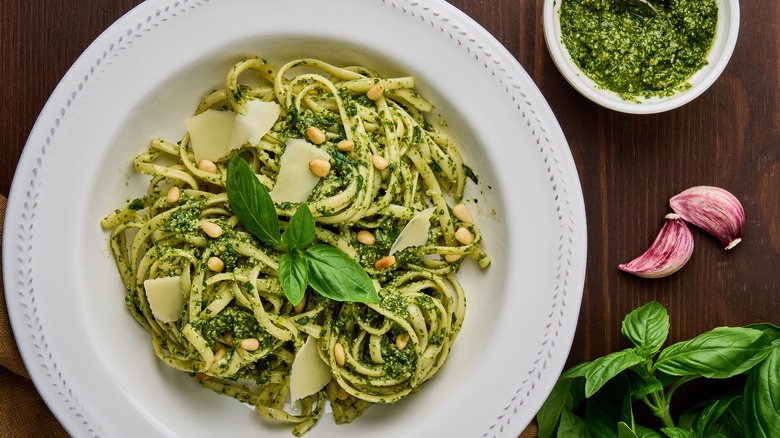Ming Tsai's Tips For Cooking Plant-Based Meals Like An Iron Chef - Exclusive
While plant-based eating is becoming an increasingly popular lifestyle choice, there are still a large number of holdouts who can't give up their meaty main courses. There are lots of reasons for this, but it largely comes down to the misconception that a plate full of vegetables for dinner will be bland and boring.
But the dedicated plant-based foodies and chefs are in on a secret that needs to be shared: Vegetarian and vegan meals can be just as if not more delicious than a meat-centric dish. There are plenty of ways that chicken can be dry and dull; fish can be flavorless; and we all know the perils of having to power through an overcooked and under-seasoned steak. The same goes for plant-based dishes. It all comes down to the effort and creativity you're willing to put in.
If you're looking to put this theory to the test, or are already convinced and need a little culinary inspo, we've got you covered with some expert guidance from nationally acclaimed Iron Chef Ming Tsai, who's made the transition to mostly plant-based eating in recent years.
During an exclusive interview with Tasting Table, Chef Ming Tsai shares some of his best Iron Chef-approved tips for cooking vegetables and plant-based meals. Essentially, he says, it comes down to enhancing your produce with spices, sauces, and herbs that not only bring out the best inherent flavors in your veggies but elevate them in ways that go beyond just piling on the salt.
Sauces, seasonings, and herbs are a plant-based cook's best friends
When it comes to dressing up vegetables to their fullest potential, Chef Ming Tsai says the key is to "think about how to enhance flavor without sodium." It's really easy to sprinkle on a generous amount of salt and basically cover up the taste of your steamed green beans and roasted squash. Instead, Tsai says, "If you use soy sauce versus salt, you're going to get a sweeter, more deep flavor." You can also cut back on the amount you use and still retain the depth of flavor by balancing things out with an acidic element. "I'll use half the amount of sodium that a recipe normally would call for, and I will squeeze a lemon or a lime or splash of vinegar in it. That makes veggies sing," he explains.
Another go-to for Tsai is vegetarian oyster sauce made with dried mushrooms. "That's a stir-fry cheat for that unctuous, deep umami flavor you get in ... all these great classic Chinese stir-fries," Tsai describes.
Finally, Chef Tsai says to transform your pastas by forgoing the heavy cream and excessive cheese in favor of tons of bright and fresh herbs, adding, "Herbs [are] the other MSG." Not only will these greens add another layer of nutrition to your dish, but they will balance out the richness and flavor of salty, starchy pasta and the olive oil or butter that you're tossing it in.
Learn more about MingsBings and find a retailer near you.

